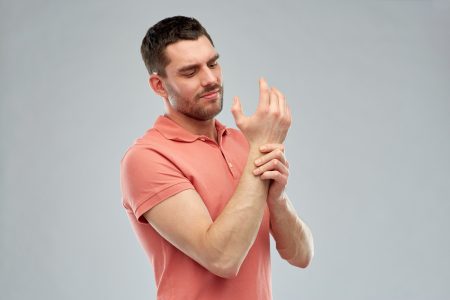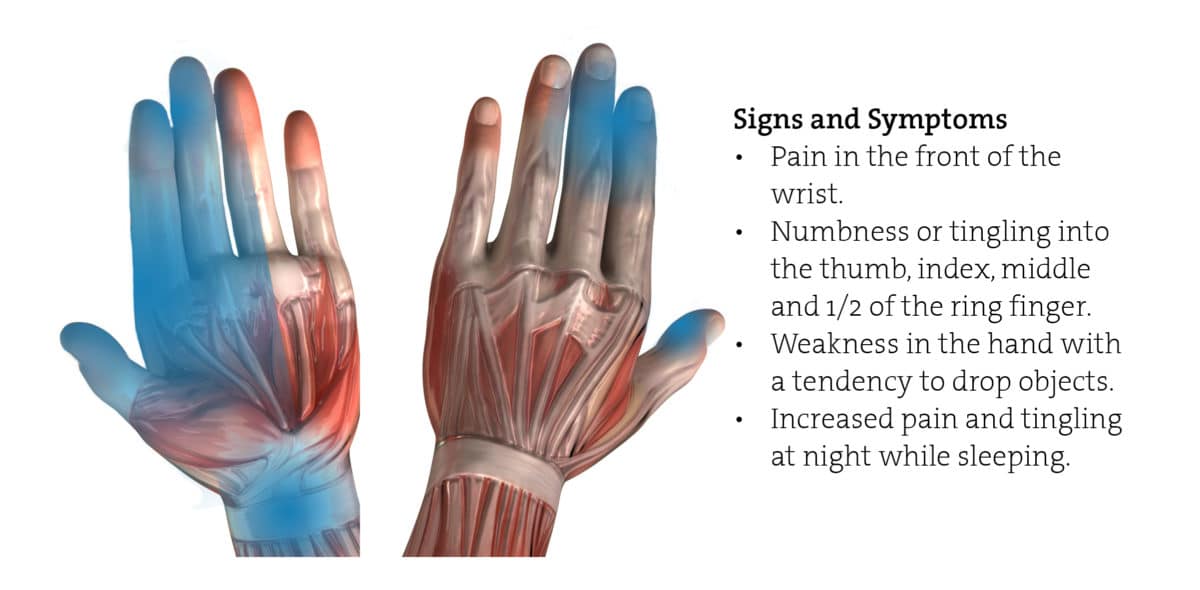108 Glen Osmond Road, Parkside

Carpal tunnel syndrome is a common condition that can cause pain or numbness in the hand and arm. The carpal tunnel is a narrow passageway on the palm side of the wrist. One of the main nerves in the hand — the median nerve — passes through this space in the wrist on its way to the hand.
The median nerve runs from the neck down through the arm to the hand. It controls the muscles at the base of the thumb. It also carries signals about sensation from the thumb, index, long, and ring fingers to the brain.
Carpal tunnel syndrome happens when the carpal tunnel becomes narrowed or when the tissues around the tendons passing through the carpal tunnel become swollen, putting pressure on the median nerve.
Causes of Carpal Tunnel Syndrome CT :
Most of the time there is no one cause that can be found for carpal tunnel syndrome, and often there are multiple risk factors that may be contributing. The most significant risk factors include:
How is Carpal Tunnel Syndrome Assessed?
Carpal Tunnel Syndrome is diagnosed with a thorough clinical examination of the arm and wrist. A nerve conduction study may also be required. A typical assessment for Carpal Tunnel Syndrome usually involves:
* A thorough evaluation of the arm and wrist
Symptoms of Carpal Tunnel Syndrome CT :
Most people with carpal tunnel syndrome report at least one of the following symptoms:

Ayurvedic Perspective On The Carpal Tunnel Syndrome :
According to Ayurveda health is maintained by balancing three Doshas namely Vata, Pitta, and Kapha. If any disturbance in this normalcy due to any food habit, or seasonal change happens, it will lead to disease. Thus treatment in Ayurveda is mainly based on the balancing of these doshas and some other factors, etc. A vitiated Vata dosha leads to carpal tunnel syndrome. Numbness, swelling, pain, and burning sensation are a sign of Vata imbalance. Therefore, a holistic approach needs to be applied while treating the condition. A vata pacifying diet and regime must be adopted.
Ayurvedic Treatment for Carpal Tunnel Syndrome CT :

The Ayurvedic herbal treatment for carpal tunnel syndrome involves giving symptomatic relief for pain and swelling as well as for numbness and burning sensation. Treatment is also given to reduce the swelling in the fibrous tissue situated in the wrist. Ayurvedic herbal medicines have a good anti-inflammatory action, which gets relief from pain, swelling, as well as other symptoms related to carpal tunnel syndrome. This treatment can also be supported by local treatment in the form of local applications as well as fomentation. Ayurvedic herbal ointments, pastes, and medicated oils are used as local therapy. Local therapy also helps in quickly reducing pain and swelling related to the condition.
Most people affected with carpal tunnel syndrome need to take Ayurvedic herbal treatment for about 1 to 2 months in order to get complete relief from the condition. People who present with an advanced condition also report symptoms of nerve damage. Such patients may require longer treatment, typically lasting for about four to six months. However, almost all patients affected with carpal tunnel syndrome recover completely with Ayurvedic herbal treatment. It is equally important for the patient to reduce the cause of the condition, in order to get earlier relief and to prevent recurrence of the condition.
Ayurvedic Therapies recommended for the condition :
Ayurvedic Herbal Formulations recommended for the condition :
All these therapies with internal medicines will help to regain muscle strength and power and also help to get relief from symptoms like pain, swelling, numbness, etc.
For Expert advice and a personalized treatment plan, please book a consultation with qualified doctors at Life Line Ayurvedic Herbal Clinic.
Disclaimer : Sandeep Kumar and Anupam Vasudeva are not GP, they have Ayurveda medical degree from India where it is considered equal to any other medical degree. This qualification is recognized in Australia by vetassess governing body as Complementary Health Therapists. Life Line Ayurvedic Herbal Clinic does not claim to cure a disease or terminal illness and does not create any unreasonable expectation of beneficial treatment. Ayurvedic medicines and treatments are generally considered to be safe but rarely may be associated with possible adverse reactions in individual cases. We recommend seeking urgent medical attention in the case of an adverse reaction. This website provides you with information. You must contact your Ayurvedic or another health professional before you apply them. Read More